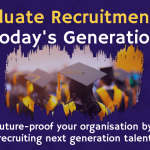Written by Ash
•
•
Graduate hiring has long been the focus of many organisations. Hefty investments have been poured in as organisations realised the importance of bringing in graduates that they can cultivate to become future leaders.
However, with the composition of graduates now being largely comprising of Gen Z, companies face new challenges in hiring from graduate schools.
Here we explore 3 strategies to use in graduate hiring that will shift recruiters into thinking like marketers.
Recruiters are often called upon to be the most agile members of HR teams as trends and shifts happen in recruitment constantly. As organisations constantly require an intake of manpower, it falls upon the recruiters to be the gatekeepers, ensuring that organisations bring in talented performers.
One of the most important programmes that recruiters oversee is college grads hiring, also known as Management Associate Programmes, Young Talent Programmes, and such. Graduate hiring campaigns focus around bringing in the best fresh university graduates that will then be developed into long-term talents in the organisation.
However, today recruiters face a different challenge in that grads fall into a demographic called Gen Z. Gen Zs have been deeply studied and characterised as a unique demographic in terms of needs, wants, social habits, and overall behaviour.
The one profession that has been able to leverage Gen Z are marketers and here we identify 3 strategies for hiring college graduates that recruiters can learn from marketers.
Click here to download free Ultimate Guide to Virtual Assessment Centres.
Key Insights:
- Be Digital First
- Start Hyper-Personalisation
- Build Your Influencers

Strategy #1: Be Digital First to Attract Graduate
For the first time, a majority of companies today have a truly multi-generational workforce that spans across 4 generations. Each of these generations has seen technology change their lives significantly.
For Baby Boomers, it was the personal computer; for Gen X, the World Wide Web; and for Millennials, the mobile technology explosion. The fourth generation, Gen Z born between 1997 and 2012, however, is different.
Gen Z are digital natives. Gen Z expects tech to be integrated into their daily lives in a way that’s different from any other generation before them as they may not even think of it as technology, it’s just ingrained into their daily behaviour.
Whilst this presents brand marketers with a new challenge, the marketers who were able to leverage these preferences of digital natives posted 2-3 times revenue very quickly – just think of Facebook and YouTube. The knowledge that Gen Z commands $44Bil in buying power and makeup 40% of all consumer shopping in 2020 drove marketers to think digital marketing first.
Similarly, research suggests that in 2020, Gen Z will make up 36% of the global workforce. As the graduates that are being hired today consist almost exclusively of Gen Z’s, recruiters, like marketers, have an opportunity to add substantial value to their organisations.
It is important for recruitment to not only digitalise components of their process but also to adopt a digital-first recruitment strategy.
Many organisations today have already replaced some processes with technology to help efficiency and optimise resources, such as replacing physical employability tests with online assessment tools and introducing Applicant Tracking Systems (ATS), but there are many elements in deploying a digital-first recruitment strategy.
As a recruiter, you can start evaluating and evolving your hiring process into being digital-first by breaking strategy into 3 areas: Attract, Acquire, & Accept.
Attract Prospective Graduate Students
Whilst companies are now balancing their talent attraction activities between physical and virtual, fully optimising your digital attraction strategy will not only increase your reach at minimal cost but also boost your employer brand.
Progressive organisations have started hosting virtual career fairs instead of physical ones as they understand that by leveraging digital platforms they can meet more applicants across geographic regions and lower investment simultaneously.
Great recruiters, like great marketers, have also become social media experts as they understand how vital this can be in hiring graduates, especially when Gen Z spends an average of 3 hours on social media daily.
Social media recruitment strategies provide recruiters with the flexibility to be as targeted as possible with multiple possible filters or cast their message as wide as needed.
While LinkedIn might be the first platform you think of, Facebook, Twitter, and even Instagram and Snapchat can help you attract high-quality candidates. An example is JPMorgan, who created their own geofilters to be used at High School and University events in the UK and US.
The thought behind their strategy was to show students that you don’t have to go down a traditional route to find employment at a bank. They highlighted different roles and jobs that one might not even think of when looking at the banking industry.
When deciding on where to apply for a job, 84% of job seekers say the reputation of a company as an employer is important. (TalentNow)
Acquire
Having a great digital graduate hiring strategy that allows reaching the right candidates and boosting employer branding will automatically lead to high applications.
To create a continuous graduate hiring funnel, organisations then need to think digital in talent acquisition.
Not having an equally digitised acquisition strategy often leads to recruiters being overloaded with work, lower quality of hired candidates, loss of strong applicants to competitors, and poor employer branding.
A digital-first graduate student recruitment strategy should enable quick and accurate screening of potential hires, feed data back to recruiters with real-time insights and still create a highly engaging user experience for both applicants and recruiters.
An example of this is organisations that are replacing traditional ability tests with game-based assessments that are not only reliable, valid, automatically deployed and scored, but also excite graduates to apply.
Another example is where traditional assessment centres that are lengthy and costly are being replaced with online simulations to increase the scalability of assessing, increase completion rates and provide multiple data points that help recruiters gain insights about candidates for improved decision making.
Accept
Many companies have planned digital strategies around attraction and acquisition. Unfortunately, at the on-boarding stage, they ignore the very last section before an applicant becomes an employee – the accept stage.
Having a digital strategy for graduates who have accepted an offer in your organisation but have not reported to work yet is extremely critical, yet often overlooked.
Engaging graduate hires with email updates at this stage increases their excitement to join your organisation, prepares them for cultural expectations, increases day 1 readiness and most importantly increases retention post offer.
New graduates typically talk with a few different companies when looking for their first full-time position. This means it isn’t uncommon to have a high-quality candidate take a job with another company after accepting yours.
Engaging graduates via email campaigns post giving them an offer is a good way to make sure they join you.
Companies that have built great digital strategies often have an entire portal dedicated to automated communications with graduate hires, covering news, virtual office tours and graduate alumni chats.
Strategy #2: Start Hyper-Personalisation Graduate Programs
Whilst the graduate talents you are looking for today are digital natives who were born into technology seeking interactive and seamless digital experiences, they also seek personalisation when they consume technology.
After growing up with digital experiences all around them, this generation, more than others before it, is starting to feel the pains of the empathy gap, the feeling of a disconnect between brands and the digital experiences they provided.
This is why it wasn’t the marketers who merely moved brick-and-mortar stores to online sales that succeeded. It was the marketers who sold the idea of a hyper-personalised online store that won Gen Z’s spend.
The key to winning Gen Z’s affection is high-tech high-touch.
The idea that from their phone they could access stores across the globe (high-tech) and view items only relevant to them as if a salesperson who knew their preferences was right there with them (high-touch).
If this concept sounds familiar, it’s because companies like Zalora and Lazada already use this approach and hence are winning online retail.
By providing personalised customer experiences supported by next-gen technologies, such as data analytics and machine learning, brands can deliver a high-tech, high-touch customer journey tailored to understanding and meeting their unique needs.
By providing personalised customer experiences supported by next-gen technologies, such as data analytics and machine learning, brands can deliver a high-tech, high-touch customer journey tailored to understanding and meeting their unique needs.
Jeffrey Puritt, President and CEO, TELUS International.
The practice of hyper-personalisation has, of course, stretched far beyond retail. Today, most advertisements we see are due to our interest and searches, the movies we get recommended are because of past viewership and the songs that shuffle are due to our genre preferences.
Recruiters must now also adopt hyper-personalisation to create a truly solid graduate hiring strategy. Personalisation in graduate hiring begins with understanding your applicants through data, which is why the great part about crafting a digital-first graduate hiring strategy is that it directly helps in hyper-personalisation because insights are collected along the way.
However, often recruiters confuse personalisation with customisation and end up not successfully executing their strategy.
Customisation is achieved when a recruiter manually makes changes to achieve his preferred experience, whereas personalisation is achieved through candidate data and predictive technology.
Career portals such as LinkedIn have become popular because they achieve hyper-personalisation by recommending job alerts relevant to candidates, even telling them how many skills they currently have that match those roles and potential ways to develop closer to those roles.
Here are some other ways we will see graduate recruitment adopt hyper-personalisation to make their organisation the graduate employer of choice.
- Automatically matching or creating jobs for graduates based on personality, social profile and other accessible variables
- Matching graduates with recruiters by using personality matching technology
- Visualising long-term career paths based on graduates interest and aspirations
- Unique interview question sets based on candidates personality and social profiles
Hyper-personalisation takes personalised recruitment a step further by leveraging artificial intelligence (AI) and real-time data to increase hiring efficiency and accuracy.
Strategy #3: Build Your Influencers
In recent years, a new form of marketing has been created that can change the way small brands compete, make big brands stay relevant and help individuals make money from brands.
This is the rise of influencer marketing.
Influencer marketing is now an established form of online marketing and has been utilised by brands across the globe. Influencer marketing is a hybrid of old and new marketing tools.
It takes the idea of celebrity endorsement and promotes collaboration between brands and influencers. Influencer marketing rarely involves celebrities.
Instead, it revolves around influencers, many of whom would never consider themselves famous in an offline setting.
As brand choices grow and consumers become more and more informed, people no longer want to know why celebrities would purchase a product.
Rather, they want to know what people like them, people from the same demographic or socio-economic status, think of a product.
The Influencer Marketing Hub defines influencers as someone who has:
- the power to affect the purchasing decisions of others because of his or her authority, knowledge, position, or relationship with his or her audience.
- a following in a distinct niche, with whom he or she actively engages. The size of the following depends on the size of his/her topic of the niche.
50% of consumers will take some action after reading a positive review
What can Graduate Hirers Learn from Marketers?
One of the biggest trends among marketers targeting Generation Z is using influencers.
They work because they’re regular, non-famous people whose lives feel authentic, and Gen Z graduates respond well to their posts because these influencers feel like peers, not celebrities.
As a recruiter, influencers can come at virtually no additional cost as you can build your influencer network from employees who have entered your organisation as graduates themselves.
Choose recently hired graduates to speak about their on-boarding and the first job thus far, ask graduates who have been in your organisation for a year to talk about the learning and support they have gotten, and let graduates who have been in your organisation for 2 years share career growth.
Many companies resort to having a member of the management team speak in these branding videos and essentially become the influencer.
However, a person who is 20-30 years into the career does not resonate with graduates.
Remember, 91% of Millennials/Gen Z’s trust online reviews as much as friends and family, as long as these online reviews come from what they view as a credible and reliable source.
Here are some additional ideas on how to build and utilise your influencer network:
- Invite hired graduates to share their daily work lives on social media
- Ask graduates to share their experience in applying and securing a job at your organisation
- Share what attributes graduates possessed to land a job in your organisation in terms of skills, experiences, competencies, etc
- Make hired graduates your spokesperson at events like career fairs, university visits and such
- Ask graduates to post when you have new open positions detailing the job expectations
Nearly a quarter of Gen Z college students start their job search before their junior year.
Whilst many elements go into building a recruiting strategy for graduate hiring, these 3 focus areas give organisations a leapfrog advantage to get the best young talents out there.
If your company is actively running graduate hiring campaigns or have successfully hired and cultivated Gen Z’s we’d like to know if you had different strategies.
Any Feedback? Let us know at [email protected]
Page Contents








